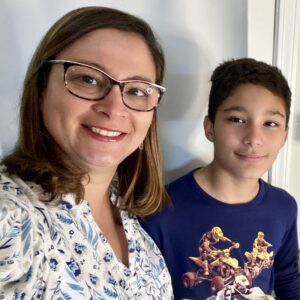By: Priscila J.B.M. Costa and Felipe Costa
The Ignition
It was September, a couple of months into the outbreak of COVID-19, and school buildings were closed for in-person learning. My son was beginning his 5th grade year and working on schoolwork virtually through daily Google Meets and several other learning platforms. We also decided to give him a smartphone to help develop better digital literacy skills. One day, while I was driving and running errands, he blurted from the backseat, “Mom, I don’t understand! This website says the Ford F-450 is the best, but at the end, it says that GMC 3500HD is better than the Ford. It doesn’t make any sense.”

As an educator and language teacher, I saw a teaching opportunity. His elementary school was a school of choice created as a national demonstration site for inquiry-based instruction. Souto-Manning et al. (2010) describe well the vision of the school and how teachers approach self-motivated inquiry. Felipe attended this particular school for two years and already learned how to take agency over his own inquiry projects. His interest in the topic of trucks was a motivating factor to use his inquiry skills on a real-life problem. It was also an opportunity to build a new digital literacy skill.
I said, “I can’t read what is on the website because I am driving now, but you can tell me more about what you are reading.”
“I’m searching which truck is the best, but in this website sometimes they say one thing, and then they say the opposite. Why don’t they make up their minds?” he asked.
“I agree. That does not make sense. Is it the same person writing the whole article, or are there several people sharing their opinions about various trucks?”
He described what he saw on the screen of his phone, “I think there is a question at the top, and people write their answers. One person wrote the Ford F-450 is better because it has more torque. It is a stronger work truck. Then, I continued reading, and there is this other person who said that the GMC 3500HD is better because it has more internal space and it is more comfortable.”
The Road to Learning

He was engaged in reading and motivated to find an answer. I pictured a Quora style forum. Reading that kind of multimodal genre requires specific literacy skills. The New London Group (1996) proposed the concept of multiliteracies, which expands the conventional definition of literacy to encompass reading texts in many other modalities beyond print. It includes new media such as all the digital resources offered by mobile devices and the Internet (Kalantzis & Cope, n.d., 2015). Jones and Hafner (2012) explain that “digital literacies involve not just being able to ‘operate’ tools like computers and mobile phones, but also the ability to adapt the affordances and constraints of these tools to particular circumstances” (p. 13).
In this circumstance, I replied to him, “That sounds like a discussion forum. It is a website where anyone can ask questions about any topic, and people who know about that topic can join and give their answers. Some answers are better than others. Some are based on facts, like scientific research, and others are just their opinions based on experience. Are those answers about the trucks based on truck facts?”
“Well, there are some facts. Like, the first one says that the Ford F-450 has 1050 lb-ft of torque. That is a fact. The other says that the GMC 3500HD has a softer suspension and it rides smoother, and that is also a fact,” he answered.
I continued asking, “Look at those facts. I don’t know much about trucks, but it sounds like they are not about the same features. I believe they are comparing apples to oranges. Why is that?”
Parking for a Lesson
He explained, “I think it depends on their opinion on what makes a good truck. Some people want a heavy-duty truck to use for work or to pull a big trailer. Other people prefer comfort and space when they use the truck to travel. So, at the end, when you read these answers, you can make your own decision depending on what you prefer for a truck.”
“And what is your conclusion?” I finally asked.
He concluded, “For me, the Ford F-450 is better because I want to have more power than comfort.”
Great! He built a literacy skill then and there. In this micro inquiry, he was able to make a critical analysis of the data he collected from the online forum. His engagement with the topic gave him motivation to read critically from a digital source and address his question. All those skills can be transferred to his academic work now that he is in middle school, because they help him read in search of information.
References
Jones, R. H., & Hafner, C. A. (2012). Understanding digital literacies: A Practical introduction. Routledge, Taylor & Francis Group.
Kalantzis, M., & Cope, B. (n.d.). Kalantzis and Cope on New Media Literacies: Technology’s Impacts on Communication [Com]. New Learning Online. Retrieved October 27, 2021, from https://newlearningonline.com/literacies/chapter-2/kalantzis-and-cope-on-new-media-literacies
Kalantzis, M., & Cope, B. (2015). Learning and New Media. In D. Scott & E. Hargreaves (Eds.), The SAGE Handbook of Learning (pp. 373–387). SAGE.
New London Group. (1996). A Pedagogy of Multiliteracies: Designing social futures. Harvard Educational Review, 66(1), 60–92.
Souto-Manning, M., Mills, H., & O’Keefe, T. (2010). Teacher as Researcher: Collaborative Inquiry: From Kidwatching to Responsive Teaching. Childhood Education, 86(3), 169–171. https://doi.org/10.1080/00094056.2010.10523141
About the Authors

Priscila J.B.M. Costa is an international doctoral student in Language and Literacy, a Holmes Scholar Alumna, and an adjunct instructor in the First Year English program at the University of South Carolina.
Felipe Costa is a bilingual 6th-grader and a truck expert.





